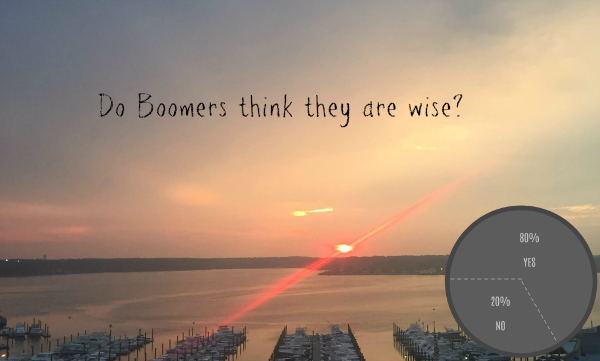When asked in a 2018 survey, “Do you consider yourself to be wise,” eighty percent of 56-75 year olds were able to say “Yes,” which is higher than the Millennial and Gen X response to this same question (average 75%).
Yes, I am Wise
With 186 individuals providing an affirmative answer to the question of personal wisdom, it is interesting to delve further into the reasons for their confidence. The chart below shows the breakdown:

Reflection and Values
These respondents indicated they were wise because they were thoughtful and reflective before taking action. They were not impulsive, and tried to remain calm in the midst of stress. It was important for them to practice non-judgement, be a reflective listener and to engage multiple points of view in decision making. Some had learned to set their ego and cultural expectations aside to be more authentic in their actions. They expressed a strong value in cultivating wisdom, some acknowledging that they were at “the beginning stage” of acquiring it but their practice of reflection was helping them to strengthen it in their lives.
Age and Life Experience
For this group, the richness of their life experience has been the fertile ground from which to grow wisdom. “As I fully inhabit my 60’s, I find myself to be a wise crone, with years of experience and self-examination.” Another person shared that he had learned much thru trials and tribulations. Others described specific experiences that shaped their wisdom like growing up on a farm, or battling with cancer. The aging process has helped them to change their perspective and experience more freedom to “be who I am” than when they were younger.
Continuous Learning
A commitment to educating one’s self, seeking knowledge from a variety of sources and applying what has been learned are the hallmarks of wisdom for these respondents. They are voracious readers and researchers, searching out others from whom to gain insights. Learning from mistakes is important too: “I look at life as a classroom and am always open to all possibilities.” From this vantage point, some have even learned to integrate their knowledge and intuition to develop a sense of “inner knowing.”
Sometimes Wise
Acknowledging the fluid nature of wisdom as a process was important for this group, whose comments indicated that they were wise sometimes. This was a comment made by many in the younger generations as well. There seemed to be an agreement among this group that unless you were knowledgeable about all subjects, insightful in every situation, than you could not state that you were wise. However, this did not mean that they checked the “no” box because they also wanted to share that they had gained a measure of wisdom in their lives only in specific areas. Or in the words of one respondent, “all my wisdom is borrowed from others.”
Feedback from Others
Only a small number indicated that they considered themselves to be wise because people came to them for advice. It was usually someone younger or a family member. However, a good portion of my 56-75 year old group as a whole seemed eager to share what they had learned with “the next generation,” but it appears they are not often asked to do so.
No, I am Not Wise
For the 20% of my respondents who checked the “no” box, it was often to acknowledge the uncompleted journey or to point out a personal trait that prevented them from demonstrating wisdom.
As with the younger generations, their comments often showed their self-awareness:
- I always learn the hard way
- I haven’t learned anywhere near my capacity. I regret that.
- Too cynical in certain situations
- I followed a course based on fear
- I’m selfish and narcissistic. I have to work at showing others kindness and charity
- I’m too judgmental before getting all of the facts
- While I am on my way, I still have much to learn from others…most notably about humility
One respondent shared that while he was aware of his imperfections, he needed to do more to “eliminate them.” Others made the observation that they often “made stupid mistakes,” but unlike the people who thought it was wise to learn from them, these folks simply saw them as a character flaw.
Once again, whether my respondents indicated they were currently wise or not, all could agree that “Becoming wise is a never-ending journey rather than a destination.” For the 239 Boomers who completed my wisdom survey, all were taking the trip with the intention of “getting there,” whether it was for their own growth or to share with the next generation.
To learn about the sources that 56-75 year olds are using to cultivate wisdom, click here
